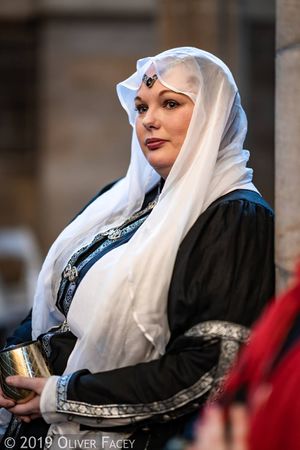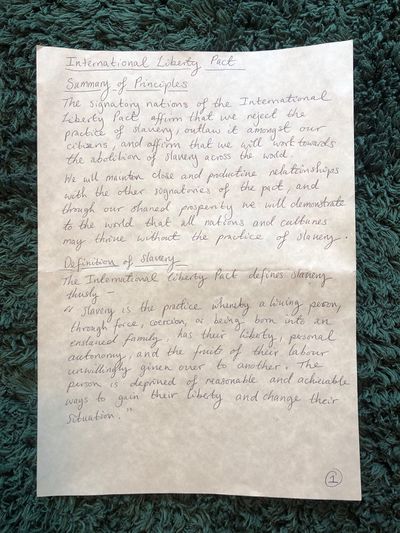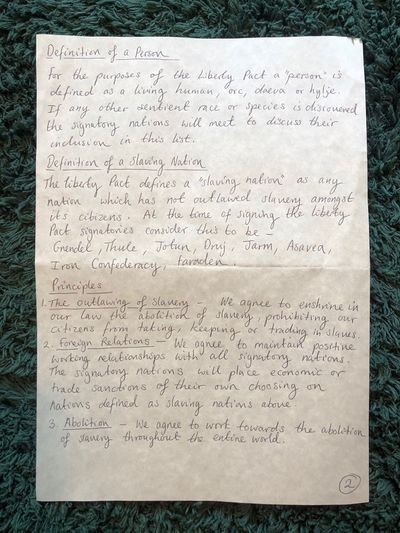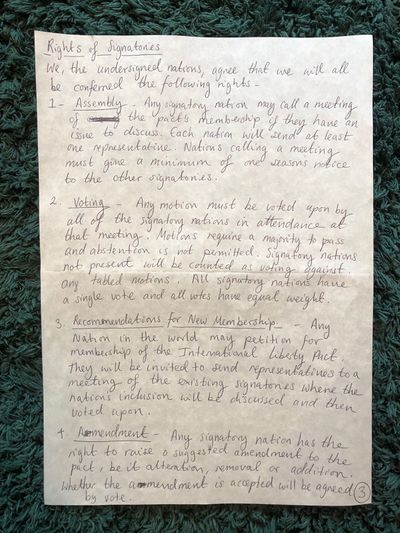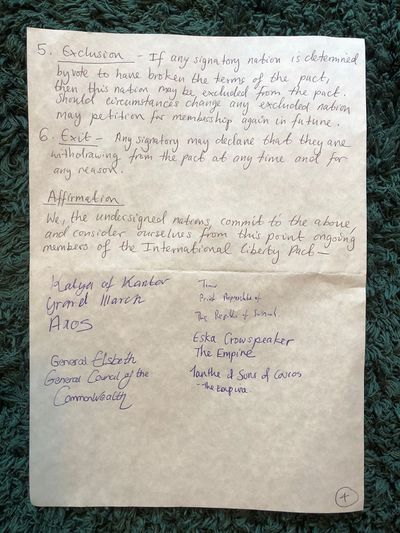Voice of Liberty
Overview
The Voice of Liberty is an Imperial Title appointed by the Senate. The title was created during the Spring Equinox 383YE, and represents the Empire at meetings of the Liberty Pact. Ratified by the Senate during the Winter Solstice 382YE, the Liberty Pact was created as a political and economic alliance between the Empire, the Sumaah Republic, the Commonwealth, and the Citadels of Axos. It is dedicated to ending slavery in the known world, initially by enforcing trade sanctions on nations that do not disavow the abhorrent practice.
As evidenced by the 384YE raid on the Asavean city of Chalonsio, and the destruction of the Slave Lords of Rachensgrab, it is clear that the alliance is also capable of taking proactive steps to discourage slavery in the wider world. The pact was amended by the Senate during the Summer Solstice 385YE, to clarify how meetings of the Liberty Pact might be called, and to make clear that no signatory was required to offer military aid to another - but it would be illegal to offer military aid to someone attacking a signatory.
Responsibilities
The Voice of Liberty is responsible for representing the Empire during any meetings of the members of the international Liberty Pact.
Powers
Amendment
The Voice of Liberty is able to present an amendment to the International Liberty Pact for consideration by the Senate. A senator must use a Senate motion to submit the amendment for ratification by the Senate - but ratification only requires a single senate motion, regardless of how many legal changes are required to ratify the amendment.
Ratification of an amendment is considered to be a single motion before the Senate because the Senate can either choose to accept the amendment or reject it. It is not possible to amend an amendment once it is presented as a motion; it either passes in its entirety in the form it was submitted or it does not pass. The only legal way for the Senate to ratify variations of an amendment would be to submit different amendments as separate motions.
As a senate motion, an amendment should be carefully worded. It should be concise and to the point, clearly laying out the actions to be taken as part of the amendment. Amendments are subject to scrutiny like any other senate motion. Perhaps more so than other motions, it is sensible to have an amendment scrutinised before it is presented to the Senate.
The empress is moved. The world is moving. And we will move to a vote.
Speaker John of MeadeAppointment
The Voice of Liberty is an Imperial position appointed by the Senate. Any Imperial citizen can hold this title.
The Voice of Liberty has tenure and serves until they die or step down. They can be revoked by the General Assembly or the Assembly of the Nine.
| Summit | Nation | Elected |
|---|---|---|
| Summer Solstice 387YE | Dawn | Jarrigk Silktongue |
| Summer Solstice 383YE | Wintermark | Eska Crowspeaker |
Recent Elections
This title is currently held by Jarrigk Silktongue. This title has tenure, the occupant may hold the title until it is revoked, they die or they relinquish the position. The table to the right shows the citizens who have been elected to hold this title in the years since Empress Britta died.
Liberty Pact
The Liberty Pact was ratified by the Senate during the Winter Solstice 382YE, and the first significant amendment made during the Summer Solstice 384YE.
Summary of Principles
The signatory nations of the International Liberty Pact affirm that we reject the practice of slavery, outlaw it amongst our citizens, and affirm that we will work towards the abolition of slavery across the world.
We will maintain close and productive relationships with the other signatories of the pact, and through our shared prosperity we will demonstrate to the world that all nations and cultures may thrive without the practice of slavery.
Summer 384YE Amendments
Signatory nations will apply a trade embargo to the Principalities of Jarm.
All signatory nations to apply free trade to other signatory nations.
Definition of Slavery
The International Liberty Pact defines slavery thusly -
“Slavery is the practice whereby a living person, through force, coercion, or being born into an enslaved family, has their liberty, personal autonomy, and the fruits of their labour unwillingly given over to another. The person is deprived of reasonable and achievable ways to gain their liberty and change their situation.”
Definition of a Person
For the purposes of the Liberty Pact a "person" is defined as a living human, orc, daeva or hylje. If any other sentient race or species is discovered the signatory nations will meet to discuss their inclusion in this list.
Definition of a Slaving Nation
The Liberty Pact defines a "slaving nation" as any nation which has not outlawed slavery amongst its citizens. At the time of the signing the Liberty Pact signatories consider this to be - Grendel, Thule, Jotun, Druj, Jarm, Asavea, Iron Confederacy, and Faraden.
Principles
1. The Outlawing of Slavery
We agree to enshrine in our law the abolition of slavery, prohibiting our citizens from taking, keeping or trading in slaves.
2. Foreign Relations
We agree to maintain positive working relationships with all signatory nations. The signatory nations will place economic or trade sanctions of their own choosing on nations defined as slaving nations above.
3.Abolition
We agree to work towards the abolition of slavery throughout the entire world.
Rights of Signatories
We, the undersigned nations, agree that we will all be conferred the following rights -
1. Assembly
Any signatory nation may call a meeting of the pact's membership if they have an issue to discuss. Each nation will send at least one representative. Nations calling a meeting must give a minimum of one season's notice to the other signatories.
1.a
Each member of the Liberty Pact can call a meeting once a year, with at least one season's notice. They may only do this by formally raising an issue to be discussed, and by presenting a motion they would like the pact to vote on. Each member of the Pact will ensure that they have provided information on any issues they plan to raise and provide the wording of any vote they wish the pact to discuss in advance of the meeting
2. Voting
Any motion must be voted upon by all of the signatory nations in attendance at that meeting. Motions require a majority to pass and abstention is not permitted. Signatories not present will be counted as voting against any tabled motions. All signatory nations have a single vote and all votes have equal weight.
3. Recommendations for New Membership
Any nation in the world may petition for membership of the International Liberty Pact. They will be invited to send representatives to a meeting of the existing signatories where the nation’s inclusion will be discussed and then voted upon.
4. Amendment
Any signatory nation has the right to raise a suggested amendment to the pact, be it alteration, removal or addition. Whether the amendment is accepted will be agreed by vote.
5. Exclusion
If any signatory is determined by vote to have broken the terms of the pact, then this nation may be excluded from the pact. Should circumstances change, any excluded nation may petition for membership again in future.
6. Exit
Any signatory may declare that they are withdrawing from the pact at any time and for any reason.
8. Military Aid
Members of the Liberty Pact understand that the pact creates no obligation or expectation of military aid be rendered to a fellow signatory, no matter what conflict ensues. However no signatory to the pact will provide meaningful military assistance to any nation that finds itself at war with a signatory of the pact.
Affirmation
We, the undersigned nations, commit to the above, and consider ourselves from this point ongoing member of the International Liberty Pact.
Katya of Kantor, Grand Ilarch, Axos
General Elsbeth, General Council of the Commonwealth
Timov, Priest Representative of the Republic of Sumaah
Eska Crowspeaker, The Empire
Ianthe of Suns of Couros, The Empire

